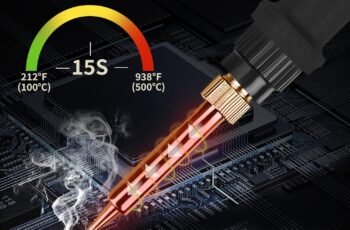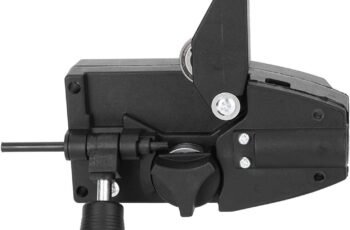Ad Blocker Detected
Our website is made possible by displaying online advertisements to our visitors. Please consider supporting us by disabling your ad blocker.
? Are you trying to find a reliable replacement gas diffuser and contact tip holder that fits your 36KD/MB36 MIG MAG torch without fuss?
Product overview: RIVERWELD MIG MAG Contact Tips Holder Gas Difuser 142.0020 M8x28mm for 36KD MB36 Co² Welding Torch Accessories Consumables Pack of 5
You’re looking at a pack designed to give you quick swaps when the original diffuser or tip holder wears out. This RIVERWELD product bundles five M8x28mm units so you can keep working rather than waiting for parts to arrive one by one. It’s meant specifically for the common 36KD/MB36 style MIG/MAG torches that use CO₂ or mixed shielding gas.
What this product is for
This part replaces the gas diffuser/contact tip holder on compatible MIG torches. You’ll use it when the existing holder is worn, damaged, or causing poor gas coverage or wire feeding issues. You’ll also appreciate having spares on hand during long jobs so downtime is minimized.
Who this is for
If you’re a hobbyist, fabricator, or professional who uses MB36/36KD torches, this pack is meant for you. You’ll get a straightforward consumable that helps maintain arc stability and shielding gas effectiveness when installed correctly.
Specifications and quick facts
You want clear, concise specs to confirm fit and function. Below is a short table to give you an at-a-glance breakdown of key details.
| Feature | Detail |
|---|---|
| Product name | RIVERWELD MIG MAG Contact Tips Holder Gas Difuser 142.0020 M8x28mm for 36KD MB36 Co² Welding Torch Accessories Consumables Pack of 5 |
| Quantity | Pack of 5 |
| Thread size | M8 x 28 mm |
| Compatible torches | 36KD, MB36 MIG/MAG style torches (CO₂ and mixed gas setups) |
| Function | Gas diffuser / contact tip holder |
| Intended use | Replacement consumable for MIG wire welding |
| Material | High-thermal-conductivity metal (designed for heat transfer and durability) |
| Typical users | Hobbyists, small shops, professional welders using MB36/36KD torches |
Why these specs matter to you
Knowing the thread size and compatibility prevents wasted purchases and downtime. The pack quantity matters if you prefer to have spares on hand so you don’t stop mid-job for a single broken part.
Compatibility and fit
You’ll want to be confident that a replacement part actually fits your torch. That’s where correct dimensioning and type matter most.
Which torch models it fits
This part is made to fit the 36KD and MB36 series MIG/MAG torches. If your torch uses an M8x28 threaded gas diffuser/contact tip holder, this pack should be compatible. That covers many common torch models used in hobbyist and light industrial settings.
How to confirm compatibility for your torch
Measure the thread on your existing gas diffuser or consult the torch’s manual. If the thread is M8x28 and the diffuser style matches a MB36/36KD design, then these parts should fit. If you’re unsure, compare the old part directly or consult the vendor with torch model and photo.
Fitment tips for a smooth install
When you install a new diffuser, ensure the threads are clean and free from debris. Hand-start the thread to avoid cross-threading, then secure with the appropriate torque so it’s snug but not over-tightened. If your torch has additional seals or an O-ring, check or replace them when swapping diffusers.
Build quality and materials
You’ll want parts that withstand heat, spatter, and repeated installation. The construction matters for longevity and consistent weld quality.
Durability expectations
These diffusers are designed as consumables with durability adequate for normal use. You’ll find that they tolerate the thermal cycling and abrasion typical of MIG welding, but they will wear over time—especially if your wire feed or alignment is off. Having five in a pack gives you replacements without additional ordering time.
What the materials do for you
The diffuser and holder need to conduct heat away from the contact tip and provide a stable mounting surface. The part is made from a metal selected for thermal conductivity and resistance to welding spatter and mechanical wear. This helps keep your arc stable and prevents premature contact tip burn-up.
How it works: gas diffuser vs contact tip holder
You should understand how this component functions in the torch assembly so you can spot problems fast.
Gas diffuser role
The gas diffuser spreads shielding gas evenly around the weld pool. You’ll notice less porosity and a cleaner weld when the diffuser is doing its job. If the diffuser is damaged or clogged, gas coverage will be inconsistent and weld quality will suffer.
Contact tip holder role
The contact tip holder secures the contact tip and aligns it with the welding wire. Consistent tip alignment minimizes wire wandering and helps maintain arc stability. If the holder is loose or deformed, you’ll see erratic feeding and inconsistent weld appearance.
Installation and setup
You’ll want installation to be quick and safe so you can return to welding with minimal downtime.
Step-by-step installation
- Disconnect power and remove the welding wire spool or cut wire feed so you can safely access the torch tip.
- Remove the nozzle and old contact tip (if present) to expose the diffuser.
- Unscrew the old gas diffuser/contact tip holder carefully. Hand-start the new part to avoid cross-threading.
- Tighten until snug using the appropriate wrench, but don’t over-torque—overtightening can damage the torch neck or threads.
- Reinstall the contact tip and nozzle, feed wire through, and do a short test weld to confirm alignment and gas coverage.
Common installation pitfalls and how you avoid them
Cross-threading is the most common issue—always hand-start the thread. Over-tightening can strip threads or warp the torch neck; use a snug fit instead of brute force. Also check that the contact tip size matches your wire diameter to prevent wire-to-tip shorts and feeding issues.
Performance and welding results
You care about how this part affects arc stability, gas coverage, and overall weld appearance. Good consumables make a notable difference.
Arc stability and wire feeding
A properly seated gas diffuser/contact tip holder helps ensure the contact tip remains concentric with the wire, which stabilizes the arc. If alignment is off, you’ll see wire deflection and inconsistent arcing. With the right fit, you should notice smoother feeding and fewer burnbacks.
Gas shielding and weld bead quality
Because the diffuser controls how gas flows around the weld, you’ll see reduced porosity and cleaner beads when it’s functioning. If shielding is compromised—due to a damaged diffuser or poor nozzle fit—your welds may show increased spatter, undercut, or porosity, especially with CO₂-dominant shielding mixes.
How performance changes with different wires and currents
Higher currents and larger wire diameters put more stress on consumables. If you weld at high amperages or use thicker wires, you’ll burn through contact tips faster and may need more frequent diffuser replacements. For light to medium duty welding, these parts usually last longer.
Maintenance and cleaning
You’ll keep the welder running well by maintaining consumables properly, extending their useful life, and reducing downtime.
How to clean the diffuser and holder
Use a soft wire brush and compressed air to remove spatter and flux residues around the diffuser and tip holder between jobs. Avoid harsh grinding on the diffuser surface—remove only loose spatter. If spatter is heavy, soak the parts briefly in an appropriate solvent and use a non-abrasive brush.
When to replace the part
Replace the diffuser if threads are damaged, the gas passages are clogged beyond cleaning, or if it’s mechanically bent or deformed. If you notice repeated feeding issues after checking alignment and tip condition, the holder itself may be the culprit and should be swapped.
Real-world durability: what you’ll likely experience
You’ll see the lifespan vary based on how you weld. Light hobby work might let a holder last for many sessions, while continuous shop use at higher amperages will shorten life expectancy. Because you get five in a pack, you’ll often replace them as part of routine maintenance without breaking workflow.
Factors that reduce lifespan
Frequent contact tip burn-back, poor wire alignment, abrasive wire coatings, and welding at high current all shorten diffuser life. Also, allowing spatter to build up on the diffuser will force more frequent replacements.
Tips to maximize lifespan
Keep your nozzle and tip clean, ensure proper wire feed alignment, and use the correct contact tip size for your wire. These small practices extend the life of each diffuser and reduce your consumable expenses over time.
Pros and cons
You’ll want a realistic list of strengths and weaknesses to decide if this pack fits your needs.
Pros
- Pack of 5 saves you from frequent reorders and downtime.
- M8x28 thread matches common MB36/36KD torches, simplifying replacement.
- Improves gas coverage and tip stability when installed correctly.
- Affordable consumable that’s easy to swap for most users.
- Good for both hobbyists and small-shop use where MB36-style torches are common.
Cons
- Consumables will wear and need periodic replacement—this is expected but still a recurring cost.
- Fitment requires correct thread and torch type; not universal for all MIG torches.
- Performance depends on correct installation and other torch components (tips, nozzle, liner condition).
- Material specifics aren’t always listed by third-party sellers; you may want to verify with the vendor if you need a particular alloy or finish.
Comparison with alternatives
You’ll want to see how this pack stacks up against OEM or other aftermarket options.
OEM vs aftermarket
OEM parts from the original torch manufacturer often match the original specs exactly and may come with manufacturer assurance. Aftermarket parts like this RIVERWELD pack are typically more cost-effective and can perform just as well when dimensions and quality meet standards. If you need absolute OEM conformity for warranty reasons, choose OEM. For value and immediate availability, packs like this are excellent.
Single purchase vs pack of five
Buying a single part might be cheaper upfront but you’ll risk downtime if it fails mid-job. The pack of five is more economical per unit and keeps you stocked for ongoing jobs. If you weld frequently, purchasing the pack pays off in convenience.
Cost and value assessment
You’ll balance cost with longevity and performance. Consumables are recurring expenses; buying smart reduces per-weld cost.
Is this a good value for your money?
If you use MB36/36KD torches regularly, the pack of five is a sensible cost-saving purchase. You get quick replacements and reduce interruption. For occasional users, a smaller buy might be sufficient, but the pack still represents a low per-unit cost.
When you might want to choose differently
If you have very low use or a torch that requires a different thread size, choosing a different configuration makes sense. If you demand exact OEM alloy specifications for specialized welding, verify the material before purchasing.
Real-world use cases
You’ll find these parts useful in a number of practical scenarios.
Hobby and DIY welding
You’ll appreciate the spare parts during home projects where access to replacement parts can be slow. Small repairs, automotive patch welding, and light fabrication work are all use cases where having extra diffusers helps.
Small shop and professional use
For small fabrication shops that rely on MB36/36KD torches, these spare diffusers support continuous workdays and reduce interruption during production runs. You’ll find that having spares on hand is a small but meaningful efficiency gain.
Training and teaching environments
If you teach welding or run a training class, you’ll benefit from bulk replacements because learners often burn through consumables quickly while learning technique. The pack helps keep multiple stations running.
Safety considerations
You’ll handle this part safely to protect yourself and your equipment.
Safe handling and installation
Always turn off power and remove the welding wire or cut feed before disassembling the torch. Wear gloves and eye protection when working with hot or spattered components. Let the torch cool if it was recently in use.
Issues to watch for
Cross-threading can damage the torch, so take care when replacing diffusers. If you smell burning or notice strange electrical behavior after installation, stop and re-check assembly—faulty installation can cause shorts or poor contact that affect performance.
Troubleshooting common problems
You’ll see issues sometimes, and knowing how to fix them quickly keeps you productive.
Poor gas coverage or porosity
Check the diffuser for obstructions and verify that the nozzle fits snugly. Confirm that gas flow settings and hose connections are correct. If the diffuser is damaged or warped, replace it.
Wire feeding issues
If feeding is erratic, inspect the contact tip for wear or the holder for damage. Verify wire path and liner condition. Replace any worn components and test again.
Excessive spatter
Check settings (current, polarity, gas mix) first. Then inspect nozzle and diffuser for spatter buildup; clean or replace as needed. Sometimes a worn diffuser causes turbulence in gas flow, increasing spatter.
Frequently asked questions
You’ll likely want quick answers to common questions before you buy or install.
Q: Will this fit my torch if it’s not labeled MB36?
A: If your diffuser thread is M8x28 and the torch uses a 36KD/MB36-style assembly, it should fit. Measure your current part or consult your torch manual to be sure.
Q: Can you use this with all shielding gases?
A: Yes. It’s designed for CO₂ and mixed shielding gases commonly used in MIG/MAG welding. Proper gas flow and nozzle fit are still required for optimal results.
Q: How often will you need to replace it?
A: That depends on usage, welding amperage, wire type, and maintenance habits. Light users might replace infrequently; heavy shop use will require more frequent swaps.
Q: Are these genuine OEM parts?
A: These are aftermarket parts. They’re typically compatible and cost-effective, but if you require OEM certification for warranty reasons, choose manufacturer originals.
Q: Can you repair a damaged diffuser?
A: Minor spatter can be cleaned, but damaged threads, warped bodies, or clogged gas passages beyond cleaning warrant replacement.
Final verdict
You’ll find that the RIVERWELD MIG MAG Contact Tips Holder Gas Difuser 142.0020 M8x28mm for 36KD MB36 Co² Welding Torch Accessories Consumables Pack of 5 is a practical, cost-effective solution for keeping MB36/36KD torches running smoothly. It gives you spares, helps maintain gas coverage and tip alignment, and reduces downtime in both hobby and small-shop settings. As with all consumables, lifespan depends on how you weld and how well you maintain your torch, but having multiple units in hand makes routine maintenance easier and faster.
If you’re aiming to stay productive, reduce interruptions, and keep your weld quality consistent, this pack is worth considering—especially if your torch takes M8x28 threaded diffusers.
Disclosure: As an Amazon Associate, I earn from qualifying purchases.






